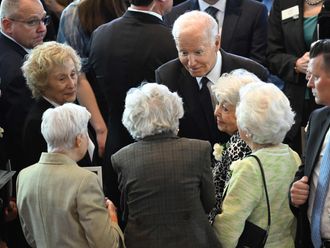Tel Aviv: Ehud Olmert, 68, will go down in the history books as the first former prime minister of the Israeli regime ever to have been sent to jail on corruption charges.
The charges, which have resulted in a six-year prison sentence, surfaced some six years ago, cutting short his political career and impacting peace negotiations with the Palestinians.
The son of Jewish immigrants from Russia and the Ukraine, Olmert was born on September 30, 1945 in the town of Binyamina, north of Tel Aviv, in Palestine.
His father was a legislator for Heirut, the precursor of Netanyahu’s hardline Likud party and Olmert, who studied psychology, philosophy and law, got involved in politics at a young age. At 28, he became the youngest lawmaker ever elected to the Knesset, the regime’s parliament.
While also gaining prominence as a lawyer, Olmert first became a minister in the 1983 and 1986 Likud governments of Yitzhak Shamir.
Starting in 1993, Olmert served for a decade as the “mayor” of Occupied Jerusalem, expanding the city’s Jewish colonies into the land comprising the occupied West Bank.
In 2003, he returned to parliament — and the cabinet — as part of the Likud government of former premier Ariel Sharon, who appointed him minister for trade and industry, communications and then finance.
Both Olmert and Sharon started out as hawks but underwent pragmatic evolutions. Olmert became one of Sharon’s strongest supporters in an otherwise rebellious Likud during the 2005 pullout from the Gaza Strip. Along with Sharon, he went on to form the centrist Kadima party that year.
When Sharon suffered a stroke at the height of his popularity, Olmert was his natural successor.
Kadima under Olmert won the 2006 elections, but months later Israel went to war with Lebanon, killing over 1,000 Lebanese, mostly civillians. He ended up spending most of his remaining term as — in his own words — an “unpopular” premier.
At a November 2007 summit in Annapolis, Maryland, Olmert revived long-stalled negotiations with Palestinian President Mahmoud Abbas.
At the height of the talks, in 2008, a decision to indict him forced him to step down.
In late 2008, he also spearheaded the regime’s war on Gaza, killing over 1,400 Palestinians, mostly civilian, and subsequently faced allegations of war crimes.
Early elections in 2009 pushed Kadima into the opposition, with Netanyahu’s Likud returning to power.
Known as a man who on a personal level enjoys the finer things in life, his family is thought to have influenced his decision to support a two-state solution.
His wife is an artist, one of his daughters is a gay-rights activist while another is in an Israeli group that monitors the conduct of soldiers at West Bank road blocks.












